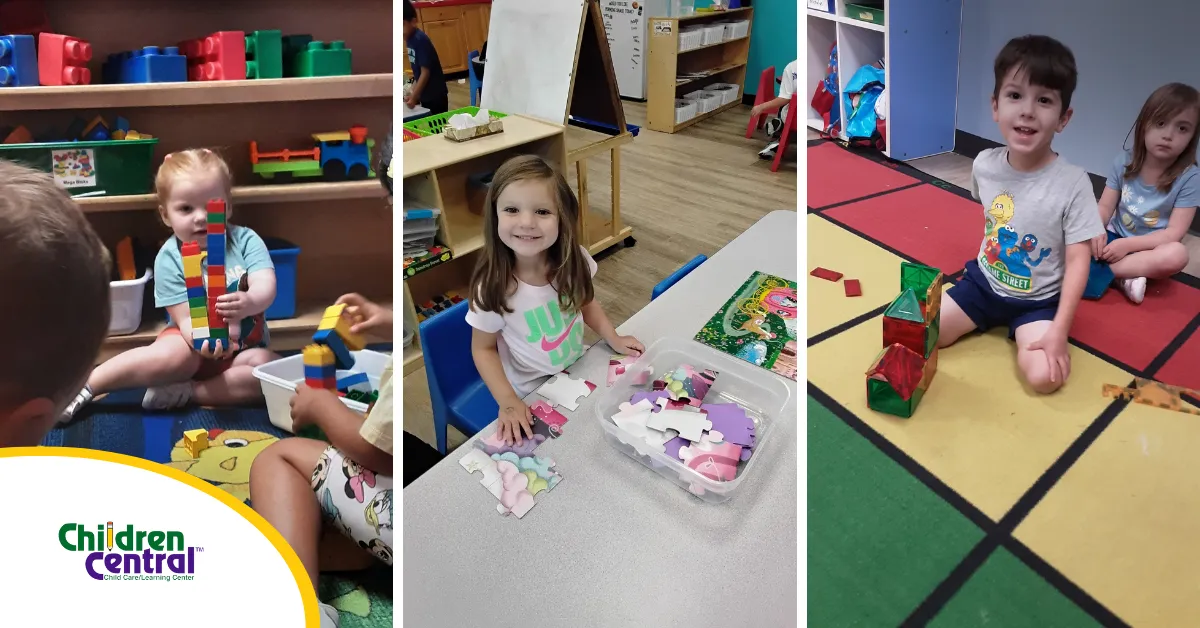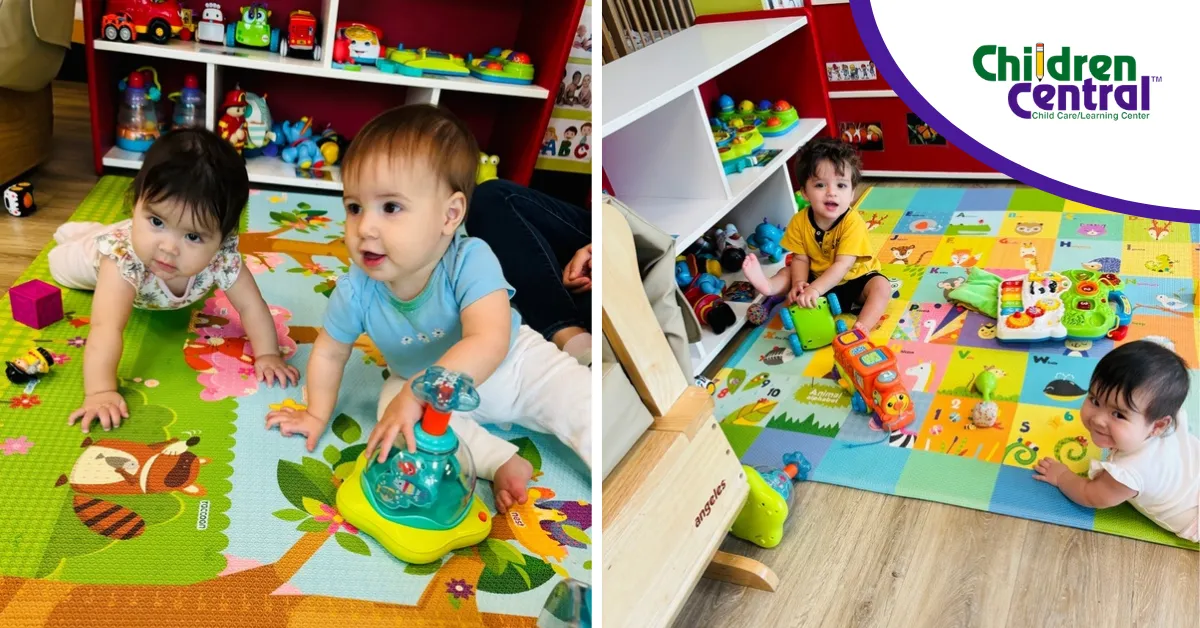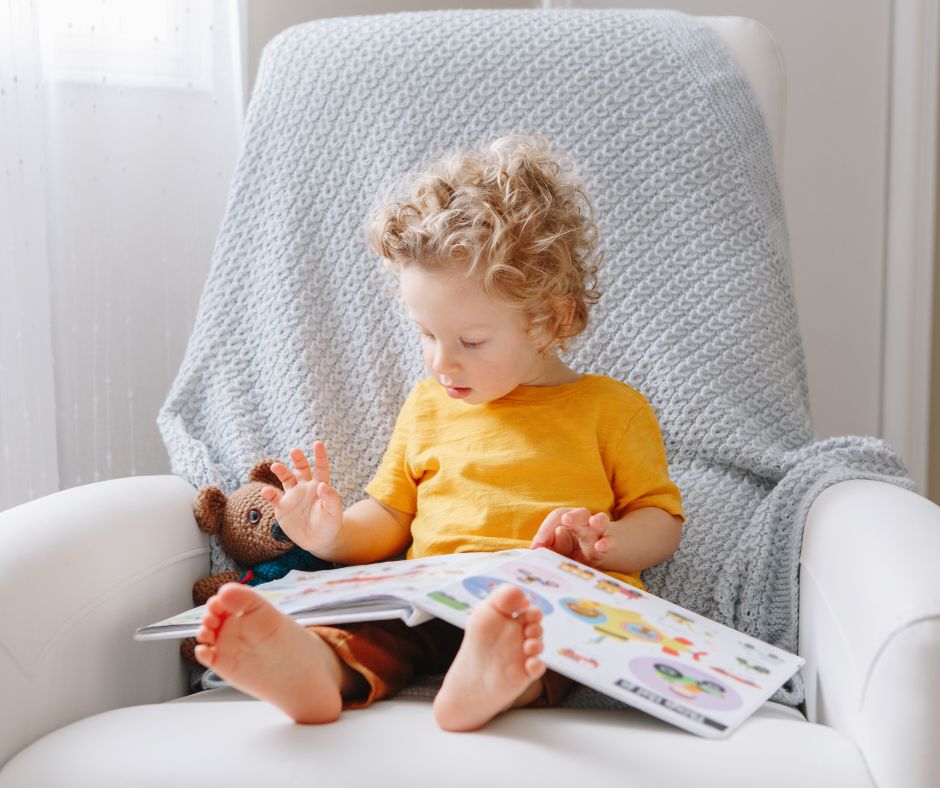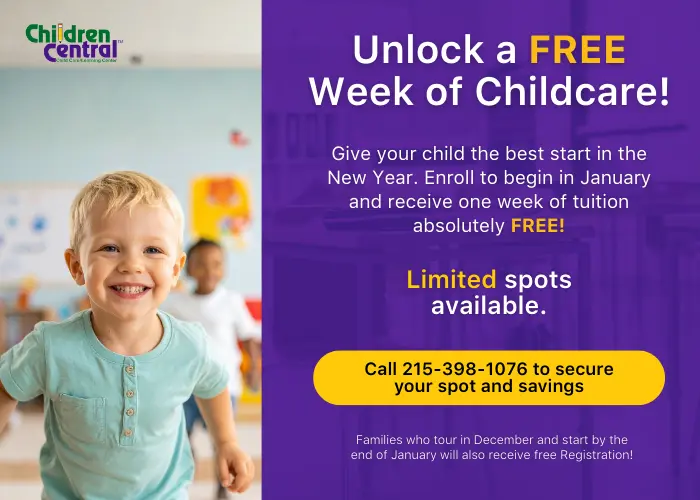Child development daycare in Langhorne, PA, provides a structured, nurturing environment that supports early milestones across social-emotional, language, cognitive, and motor domains. High-quality classrooms combine responsive caregiving with research-based curriculum, purposeful play centers, and small-group instruction to build attention, self-regulation, and school readiness.
Ongoing observation and developmental assessments guide individualized activities, and consistent home-to-school communication helps families reinforce progress. With safe facilities, low ratios, and alignment to Pennsylvania Early Learning Standards, children gain the foundation needed for confident transitions into Pre-K and beyond.
What Families Gain from a Daycare That Supports Early Development

Families value programs that pair warmth with evidence-based practice. A daycare that supports early development builds skills across language, social-emotional, cognitive, and motor domains through consistent routines, rich play, and intentional teaching. The result is steady growth that aligns with Pennsylvania Early Learning Standards and supports confident transitions into Pre-K.
Evidence-Based Curriculum and Purposeful Teaching
Quality classrooms use research-guided frameworks to plan experiences that meet children where they are. Teachers observe, scaffold, and document progress so each child advances at a suitable pace.
- Language and literacy: Daily read-alouds, songs, and conversations expand vocabulary and comprehension.
- Early math and science: Sorting, measuring, and simple investigations build number sense and inquiry habits.
- Social-emotional learning: Emotion labeling and problem-solving practice strengthen self-regulation and empathy.
This intentional cycle of plan, teach, assess, and adjust ensures growth across domains and keeps goals transparent for families. Portfolios and brief checkpoints show how new skills connect to prior learning.
Responsive Caregiving and Secure Relationships
Consistent, nurturing relationships are the foundation of healthy brain development. Low ratios and a primary caregiver model allow attentive, individualized care.
- Serve and return interactions: Timely responses to cues reinforce attention, confidence, and communication.
- Predictable routines: Visual cues and gentle transitions lower stress and promote independence.
- Family partnership: Ongoing dialogue aligns classroom strategies with home priorities.
Children gain trust in the environment, which supports exploration, persistence, and positive behavior.
Play-Rich Learning Centers and Daily Routines
Development accelerates when children engage in well-designed play with skilled teacher guidance. Diverse centers and outdoor spaces translate curiosity into measurable skills.
- Dramatic play: Role play strengthens language, cooperation, and self-control.
- Blocks and manipulatives: Building and patterning grow spatial reasoning and early math.
- Art, sensory, and outdoor movement: Creative work and gross-motor play enhance fine motor control, balance, and problem-solving.
A balanced schedule blends small groups, choice time, meals, rest, and enrichment. Consistent rhythms create space for mastery while keeping children focused and ready to learn.
Key Milestones for Toddlers in Daycare: What to Expect from 12–36 Months

Toddlers progress rapidly when daily routines, responsive caregiving, and purposeful play work together. In a high-quality daycare setting, teachers observe growth across social-emotional, language, cognitive, and motor domains and scaffold each child’s next step. The ranges below are typical; individual timelines vary and are supported through individualized goals.
Social-Emotional Growth (12–36 Months)
Secure relationships and predictable routines help toddlers practice cooperation and self-regulation. Small groups and guided play create opportunities to read cues and solve conflicts with support.
- Emerging autonomy: Children express preferences and practice simple choices.
- Cooperative play: Peers move from parallel to brief turn-taking with teacher coaching.
- Emotion labeling: Words and visuals help identify feelings and select calming strategies.
- Simple problem solving: Guided scripts build skills for sharing and asking for help.
Consistent expectations and warm feedback strengthen confidence, flexibility, and classroom citizenship.
Language and Communication
Rich talk, songs, and stories expand vocabulary and comprehension. Teachers model gestures and words, then extend utterances to encourage longer phrases.
- Vocabulary bursts: New nouns and action words appear across routines and play.
- Two- to three-word phrases: Children combine words to request, describe, and comment.
- Following directions: Toddlers respond to one- and then two-step instructions.
- Early conversation: Back-and-forth exchanges grow with visual cues and repetition.
Daily read-alouds, picture cues, and dialogic questioning foster clear communication and early literacy habits.
Cognitive Development and Early Math/Science
Hands-on exploration links curiosity with reasoning. Teachers introduce simple concepts, then invite children to predict, test, and compare.
- Cause and effect: Actions with toys, water, and sand show how things change.
- Sorting and matching: Shapes, colors, and sizes support categories and patterns.
- Symbolic play: Pretend scenarios connect experiences to emerging abstract thinking.
- Simple sequencing: Children recall and retell steps in routines and stories.
Documented investigations and brief small-group work build attention and problem-solving stamina.
Motor and Self-Help Skills
Daily movement, art, and practical life activities develop coordination and independence. Teachers model safe risk-taking and adaptive strategies.
- Gross motor: Climbing, running, and stairs with support progress toward balance and agility.
- Fine motor: Scribbling, grasping tools, and simple manipulatives refine hand strength.
- Feeding skills: Utensil use and open-cup practice improve control and focus.
- Self-care: Early dressing steps and toilet readiness routines build autonomy.
Outdoor play and classroom tasks reinforce strength, precision, and confidence in everyday routines.
Learning Through Play in Langhorne, PA: How Play-Based Care Builds Skills
Play-based care in Langhorne, PA, uses intentional centers and teacher-guided exploration to convert curiosity into measurable growth. Structured routines align with Pennsylvania Early Learning Standards and develop language, cognition, social-emotional skills, and motor coordination through purposeful play.
Dramatic Play and Social Skills
Role play offers a safe context to practice communication and self-regulation. Teachers model language and guide turn-taking to build cooperative behaviors.
- Role negotiation: Children agree on roles and solve simple conflicts respectfully.
- Emotion language: Feeling words and visuals support self-expression and calming choices.
- Community scripts: Themed play (store, clinic, home) connects real-world routines to classroom learning.
Brief reflections after play help children generalize skills to other parts of the day.
Blocks, Math, and Early Science
Open-ended construction invites planning, testing, and revision. Educators prompt comparisons and predictions to deepen reasoning.
- Spatial thinking: Stacking and bridging strengthen balance, symmetry, and perspective taking.
- Early math: Counting, patterning, and measuring introduce number, sequence, and size.
- Inquiry skills: Simple trials answer “Which is stronger?” or “What happens if…?”
Photos and child dictation document design ideas and highlight problem-solving stamina.
Language, Literacy, and Music
Rich talk, books, and rhythm build comprehension and clear expression. Musical activities reinforce phonological awareness and memory.
- Dialogic reading: Open questions extend vocabulary and narrative understanding.
- Print awareness: Labeled centers and sign-in routines connect symbols to meaning.
- Rhythm and rhyme: Chants and songs support syllable hearing and sound play.
Daily read-alouds and small-group storytelling nurture attentive listening and confident speech.
Art, Sensory, and Fine-Motor Development
Hands-on media promote exploration, control, and persistence. Guided choices encourage planning and careful tool use.
- Tool grasp: Crayons, brushes, and tweezers refine hand strength and precision.
- Process focus: Color mixing and texture play emphasize discovery over product.
- Self-expression: Open-ended materials invite individuality and flexible thinking.
Portfolios capture progress from broad strokes to intentional lines and simple designs.
Outdoor Play and Gross-Motor Confidence
Well-supervised outdoor play advances strength, coordination, and risk assessment. Natural elements add variety and challenge.
- Core movement: Climbing, running, and jumping build balance and agility.
- Coordination: Balls, trikes, and obstacle paths support timing and control.
- Nature inquiry: Observing weather, plants, and insects encourages careful noticing.
Consistent outdoor time complements indoor learning and supports healthy, confident movement.
Daily Schedule Framework that Nurtures Whole-Child Growth
A well-sequenced day creates safety, focus, and steady progress across developmental domains. Predictable rhythms allow toddlers and preschoolers to practice emerging skills while teachers individualize support within a consistent structure.
Arrival, Morning Meeting, and Predictable Routines
Early moments set the tone for connection and regulation. Calm hellos, visual schedules, and brief group gatherings orient children to the day’s plan.
- Welcoming transitions: Greeting rituals and name recognition activities reduce separation stress and build belonging.
- Visual cues: Picture schedules and simple timers clarify expectations and timing for young learners.
- Morning meeting: Songs, movement, and short discussions strengthen attention, listening, and classroom citizenship.
This opening sequence fosters secure attachments and prepares children for active learning during centers and small groups.
Small Groups, Centers, and Play-Based Exploration
Instruction alternates between targeted skill practice and child-initiated play. Teachers scaffold language, problem-solving, and executive function through intentional prompts.
- Skill focus: Brief small-group lessons address early literacy, numeracy, and fine-motor objectives.
- Purposeful centers: Dramatic play, blocks, writing, and discovery areas translate curiosity into measurable growth.
- Teacher prompts: Open-ended questions extend thinking, collaboration, and persistence.
This balance supports differentiated progress while maintaining engagement and joy in learning.
Nutrition, Rest, and Self-Care Habits
Health routines sustain attention and emotional stability. Unhurried meals and restorative rest periods help children reset for afternoon learning.
- Balanced meals: Family-style service encourages manners, conversation, and utensil control.
- Restorative rest: Quiet time with soothing routines supports self-regulation and memory consolidation.
- Practical life: Handwashing, toileting readiness, and clean-up build independence and confidence.
Carefully guided self-care embeds executive-function practice within everyday moments.
Outdoor Movement and Afternoon Wrap-Up
Under close supervision, daily outdoor play advances strength, coordination, and risk assessment. End-of-day rituals consolidate learning and strengthen the home–school connection.
- Gross-motor challenges: Climbing, balls, and obstacle paths build balance, agility, and planning.
- Nature inquiry: Weather observations and simple investigations promote curiosity and careful noticing.
- Reflection and send-off: Brief reviews, portfolios, and family updates highlight progress and next steps.
Consistent closure affirms effort, communicates growth, and sets clear expectations for the following day.
Conclusion
High-quality daycare lays a durable foundation for growth across every domain. Children practice language, social skills, problem-solving, and motor control in a structured, nurturing environment through purposeful play and consistent routines. Teachers observe progress, individualize goals, and partner with families so new skills build steadily over time. Health and safety practices, balanced nutrition, and daily outdoor movement sustain attention and emotional stability. Children who meet age-appropriate milestones and strengthen executive function gain the confidence needed for a smooth transition into Pre-K and the early grades.
Arrange a visit today to start a strong path forward: call (215) 398-1076 or use the contact page at https://childrencentral.net/contact-children-central/.




